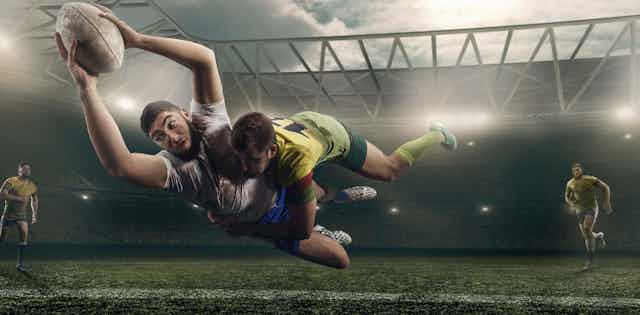The serious harm caused by concussion in sport first became apparent among the “punch-drunk” boxers who suffered repetitive blows to the head over the course of their fighting careers. A related form of brain damage is known to affect a range of other sports and professions, where repeated head injuries kill brain cells and gradually cause the brain to shrink.
By working closely with elite rugby union players, our research has now helped us to understand the impact of concussion on the brain as we get older. We have shown that brain function in a young player with a history of concussion is on a par with someone in their 60s. In simple terms, concussion seems to accelerate biological brain ageing by as much as three decades.
One important discovery was that concussed rugby union players have more “free radicals” – unstable, cell-damaging molecules – in their blood. They also have less nitric oxide, a beneficial molecule which allows more oxygen and glucose to get to the brain. As a result, blood vessels in the concussed brain react sluggishly to changes in blood flow, a condition known as “cerebrovascular impairment”.
Cerebrovascular impairment has been linked to cognitive dysfunction, and can have a negative effect on the way a person thinks, concentrates, formulates ideas and remembers. It can also make them more vulnerable to dementia in later life. In our analysis, these impairments were mostly seen in the regions of the brain where head contact is most frequently made during play.
Both active and retired elite rugby union players were found to be cognitively impaired compared with people of a similar age and fitness, who had not been concussed or participated in contact sports. The effects also appeared to be related to a player’s position in the rugby team. They were particularly prevalent among forwards, who usually experience more tackles and collisions in a game compared to the backs.
Game changer?
Positive steps have been taken in the world of rugby as awareness has grown from the negative effects that concussion has on the brain. Indeed, we have come a long way since 2005, when a neuropathologist working in a Pittsburgh coroner’s office became the first to identify a form of neurodegeneration called “chronic traumatic encephalopathy” (CTE) in an American Footballer who had suffered repetitive brain injuries.
Read more: Will the law strike a knockout blow on concussion in rugby?
But the problem has not been solved. And the increasingly gladiatorial nature of the modern game, with players whose physiques resemble those of a bodybuilder, mean the risks could be worsening. So what can be done to reduce the potentially life-altering effects of concussion in rugby players?
One approach involves changing the rules of the game. While some adjustments have been proposed, such as waist height tackling to reduce the number of head-to-head collisions, some argue that the tackle should be banned altogether. Others, including ourselves, have focused on establishing effective molecular (blood, saliva, urine) and cerebrovascular (brain blood flow) assessments for pitchside detection of concussion to enable swifter treatment and recovery.

While these remain in development, there are methods that rugby players – and anyone else – can use to help our brains fight off the risk of dementia. These include high-intensity interval training (HIIT) and regular aerobic exercise.
This is because exercise helps maintain a healthy body weight and promotes the release of nitric oxide, which improves the way our blood vessels function and contributes to better brain health.
For now, though, concussion across all sports remains a prominent and potentially life-altering injury, with the true consequences often only noticed when it is too late. There are almost 10 million rugby players around the world, and professional players are more likely than not to sustain a concussion within 25 games.
And while modern treatments and management protocols for concussion have improved with increased monitoring and neurological testing, the mechanisms which increase an athlete’s susceptibility to CTE and other neurological complications remain poorly understood.
Meanwhile, rugby union’s governing bodies have faced criticism for the lack of concussion management. But perhaps this should come as little surprise given that not very long ago, in the amateur era of the game, the traditional treatment for a knock to the head was a “magic sponge” doused in cold water.

